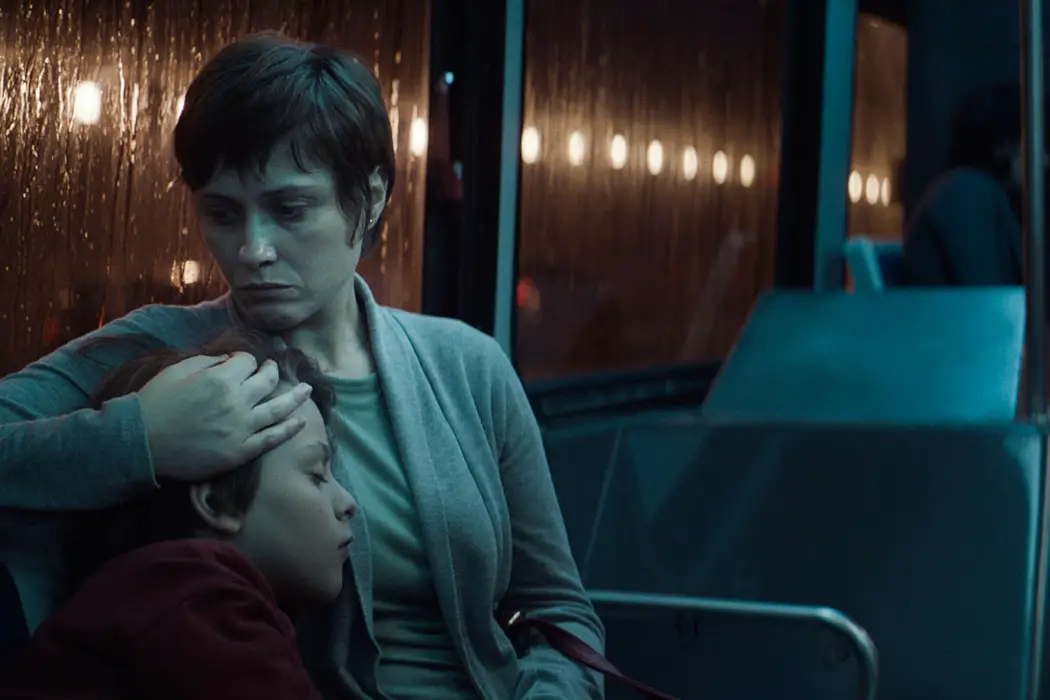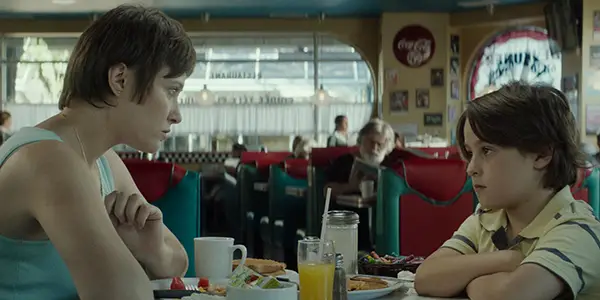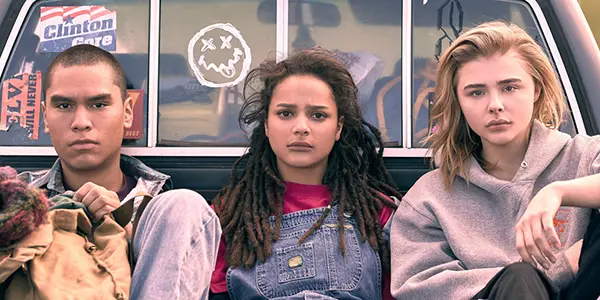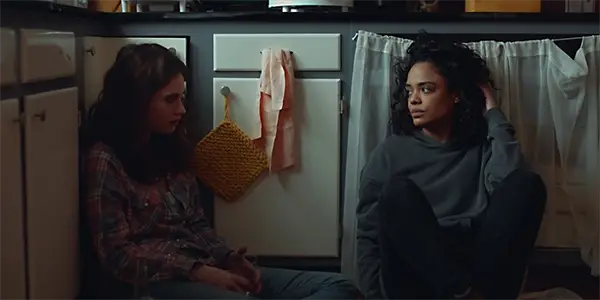Tribeca Reviews: Women-Directed Coming-of-Age Films: ALL THESE SMALL MOMENTS, LEMONADE, THE MISEDUCATION OF CAMERON POST & LITTLE WOODS

David is a film aficionado from Colchester, Connecticut. He enjoys…
At Tribeca 2018, I was able to see a great variety of films, from horror to documentaries to a category that, coincidentally, also happened to be directed entirely by women: that of coming-of-age. To be fair, some of these films focus on people at varied stages of life, such as Lemonade, which is about an immigrant mother attempting to make it in America.
Yet they all share quintessentially the same theme, that of finding purpose and focusing on the meaningful transitions between stages of life. In a category often dominated by men, they offer diverse and well-rounded perspectives, shining a light on just what it means to discover yourself.
All These Small Moments (Melissa B. Miller-Costanzo)

All These Small Moments is almost exactly what its title suggests. Taking place in New York City, the film is a series of conversations and small exchanges as Howie Sheffield (Brendan Meyer) transitions from his last few months of high school to college. With his family life at home uneven, Howie’s infatuation for the beautiful Odessa (Jemima Kirke) is often his distraction, a girl he sees on the bus everyday on the way to school. His attraction builds until, one day, he finds that she is flirting back with him, leading to a rather uncomfortable encounter.
Melissa B. Miller-Costanzo‘s debut contains nearly all the trappings of a standard coming-of-age tale (conveniently also starring Molly Ringwald as Howie’s mother, in one of her best roles in years). Expect to find plenty of playful flirtations and raging teenage hormones, all the while accompanied by a score laced with twangy guitar. Where the film flourishes most, though, is in its unwavering ability to show awkwardly long periods of silence, which nearly everyone can relate to if they’ve ever struggled in their grasp of what to say next to somehow they have an attraction to.
All These Small Moments reminded me a great deal of two films in particular: that of the recent Lady Bird and this year’s very underseen and underrated Blame. Its framework and quickly-edited montage style reminded me of Lady Bird, while its story of a younger person developing an infatuation for someone older is very reminiscent of Quinn Shepherd‘s directorial debut, in which a shy girl is attracted to her older teacher. Interestingly, Miller-Costanzo‘s film inverts the genders, focusing on a younger boy attracted to an older woman. Either way, both films have a firm grasp on the developing sexuality of youth and how, though often naive at first, these beginning stages are essential to developing a person’s overall awareness of who they are.
Lemonade (Ioana Uricaru)

From director Ioana Uricaru, Lemonade is about Mara (Mãlina Manovici), a woman from Romania who has been living in America for a few months. Having recently married, and in the process of receiving her green card, she brings over 9-year-old son Dragos (Milan Hurduc) to live with her and new husband Daniel (Dylan Smith). Complications arise, though, when Mara is accused by immigration official Moji (Steve Bacic) of lying on her paperwork, while later on she is questioned by police officers after leaving her minor son attended; all the while leading Mara to question whether she made the right choice in deciding to stay in America.
Lemonade is a film that couldn’t have come at a better time. Its often devastating series of events document the struggles of recent immigrants in America, not only legally but with the way they are treated by people in the so-called “Land of Opportunity.” There are those who will take outright advantage of Mara, while others, who are seemingly kindhearted, soon show their true disdain that they had been holding within. Significantly, the people who are the most inviting to her are often immigrants themselves, sympathizing with their mutual plight of attempting to make it in this country.
A tough watch, Lemonade is often unashamedly brutal. With a lack of a score, much of the film consists of long, minimally edited conversations between Mara and others, including one particularly tense crescendo of an exchange taking place within a car. Throughout, Mãlina Manovici is a fiery presence as Mara. With every desperate act that Mara endures, she somehow still rises above it, attempting to see the good in this country despite its ugliness. Uricaru‘s powerful film is one that should be seen by all, showcasing the idea that, though America is not quite the shining beacon that it once was, if there are still those that look out for each other, perhaps there is but a glimmer of hope.
The Miseducation of Cameron Post (Diseree Akhavan)

Based on a novel of the same name, The Miseducation of Cameron Post takes place during the 1990s. The film focuses on Cameron Post (Chloë Grace Moretz), a young girl who is caught engaging in sexual relations with her friend Coley (Quinn Shepherd) and subsequently sent to a conservative Christian camp called Promise in hopes of being cleansed of her same-sex attraction (or SSA as they call it). While there, she makes friends with a girl named Jane Fonda (Sasha Lane) and Adam Red Eagle (Forrest Goodluck), two rebellious kids who were sent to camp for the same reason but soon start to question Promise’s legitimacy.
Diseree Akhavan‘s film is clearly meant to be a satire of far-right conservative Christian beliefs, which in our current time feel as outdated as the hilariously serious Dr. Lydia Marsh, one of the leaders of the Promise camp in the film (wonderfully played by Jennifer Ehle). Yet, the idea of conversion therapy is still something that is held by high-ranking government leaders, including our own Vice President for Pete’s sake. The film manages to have fun playing around with this inherent absurdity, while at the same time showing just how damaging it is to instill the idea in a young person’s mind that their fundamental nature is something they should be ashamed of.
Despite its agenda, some of The Miseducation of Cameron Post does feel inconsequential. There are characters that are underused or don’t have as much impact as they could, such as the one played by American Honey’s Sasha Lane, and an overall sense that their arcs aren’t quite as developed as they could be. The final few moments of the film seem to ram this home, as the characters travel off to an uncertain future; though perhaps that’s really the point after all – where does one go when they realize that everything they’ve been taught is a lie?
Little Woods (Nia DaCosta)

The directorial debut of Nia DaCosta (who also won the Nora Ephron prize at Tribeca shortly before I saw the film), Little Woods is a quiet yet impactful film. It focuses on two sisters named Ollie (Tessa Thompson) and Deb (Lily James) living in North Dakota. Ollie is recently released from prison due to her earlier activities of illegally transporting drugs and medication across the Canadian border, while Deb is a single struggling mother of one who recently discovered that she is pregnant with another child. Ollie, though determined to fly straight and to move onto a job in another town, decides to sling drugs one last time in order to help her sister get by while she is gone.
DaCosta‘s film is hauntingly nostalgic for a world gone by. Focused on a small community where people seem to have been left in the early 20th century, Little Woods shows the struggles and desperation that lead to a life of crime, and the sometimes inescapable pull of turning back to it. In this way, it could be seen as a feminized and more down-to-earth version of Hell or High Water, a film that also focuses on people attempting to rise above the misfortunes that are often intertwined with small communities.
If Lily James‘s Deb represents the people down on their luck in these communities, it is Tessa Thompson‘s Ollie who signifies hope, determined to make it out of this constraining space. Thompson, on a recent hot streak between Thor: Ragnarok, Annihilation, and TV’s Westworld, here plays Ollie in a much more restrained yet no less stirring manner. She is undoubtedly the soul of the film, and DaCosta‘s confident direction ensures that she has plenty of space to show it between the quietly moving moments of Little Woods.
Coming-of-Ages Films at Tribeca: Conclusion
Well that sums up my first roundup of films from this year’s Tribeca Film Festival. All four films, though with widely ranging subjects, managed to be effective portrayals of the transitions of life, ranging from the angst of youth to the difficulties present in the experience of a recent immigrant. I hope to see more in the future from all four of these women, who, along with many others at Tribeca (46% of the films were from women directors), have solidified once and for all that filmmaking deserves, nay needs, diverse voices.
Have you seen any of the films discussed? What are your thoughts?
Does content like this matter to you?
Become a Member and support film journalism. Unlock access to all of Film Inquiry`s great articles. Join a community of like-minded readers who are passionate about cinema - get access to our private members Network, give back to independent filmmakers, and more.
David is a film aficionado from Colchester, Connecticut. He enjoys writing, reading, analyzing, and of course, watching movies. His favorite genres are westerns, crime dramas, horror, and sci-fis. He also enjoys binge-watching TV shows on Netflix.













